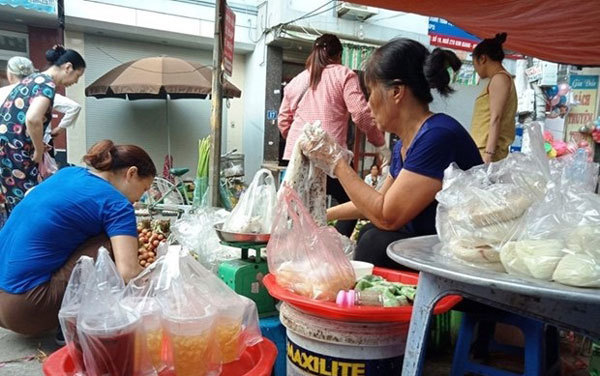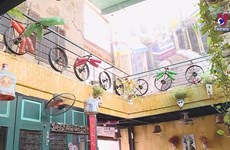VietnamPlus reporters have observed that single-use plastic is still commonly used at markets and supermarkets in Hanoi.
 |
| Plastic bags are still popular packaging at traditional markets in Hanoi. — VNA/VNS Photo Hung Vo |
Leaving Dai Tu Market, one of the busiest markets in Hoang Mai District, each person carries two to five plastic bags on average. Some even carry 10 bags with meat, fish and vegetables inside.
Along Kim Giang Street which leads to Dai Tu Market, roadside stall owners put food and drinks into plastic cups, bottles and styrofoam boxes for takeaways.
Plastic packages are scattered on the ground next to the stalls.
Nguyen Thi Huyen, a housewife in Hoang Mai District, said there was a large number of visitors to Dai Tu Market every day so the daily amount of plastic waste discharged from the market is huge.
The VietnamPlus reporter witnessed the same situation at other big markets in Hanoi like Kim Giang Kim Van Kim Lu in Hoang Mai District, Hom Market in Hai Ba Trung District and Long Bien Wholesale Market.
At the end of the day, collectors struggle to load fully-packed plastic bags to trash trucks.
Even supermarkets and fast-food restaurants have returned to using plastic for packaging because of its convenience and low prices.
A package of 100 plastic bags to wrap products before shipping can be bought for only VND30,000 (US$1.3).
It costs sellers VND5,000-10,000 ($0.2-0.4) for 100 plastic straws and VND10,000-20,000 ($0.4-0.6) for 50 plastic cups.
Nguyen Thi Hoa, a food seller at Kim Giang Market, told VietnamPlus that she knew it was necessary to reduce plastic waste to protect health and the environment but customers must bring their own reusable bags so food sellers like her no longer have to give them plastic bags.
“Some bring bags made from cloth but it’s just a small number of customers. When customers ask for bags, we still have to use plastic.
“Because plastic is cheap and convenient, the habit of using plastic bags is hard to be changed,” she said.
Nguyen Thuong Hien, deputy head of the Vietnam Environment Administration, admitted that plastic use at markets in Hanoi was still common.
Despite studies showing that plastic pollution has become one of the biggest challenges countries worldwide face, it is difficult to change the public's habit of using plastic packaging, he said.
The Ministry of Natural Resources and Environment is working on a number of initiatives to make the campaign more practical. One of them is to amend the law to increase taxes on plastic bags so that “non-biodegradable and toxic plastic bags will no longer be produced,” he said.
As Vietnam aims to completely remove plastic bags which are difficult to decompose at supermarkets by 2025, “supermarkets must not give customers plastic bags for free. Customers have to pay if they want to use. Coffee shops and restaurants must commit to no single-use plastic,” he said.
“We need specific penalties for violations and supervision from the community,” he told VietnamPlus.
“I think people need to raise awareness about environmental protection by limiting the use of non-biodegradable plastic bags. Please say no to non-biodegradable plastic bags and single-use plastic items. Using plastic may be cheap and convenient but it certainly affects your own health and environment,” he said.
According to the Ministry of Natural Resources and Environment, Vietnam releases about 2,500 tonnes of plastic waste every day, accounting for 7 per cent of solid waste.
In Hanoi, roughly 4,000-5,000 tonnes of waste are discharged every day. About 7 to 8 per cent of it is plastic. VNS
Hung Vo

Hanoi needs more drastic plastic waste solutions
Hanoi has set the target of reducing hard-decomposed plastic bags by 50% at all local traditional markets by the end of 2020, but little has been done to make this a reality.

Giving plastic waste a new life
Everyone can protect the environment in many ways, including recycling plastic waste. In response to World Environment Day 2020, let’s meet some youngsters who have given plastic waste a new life!